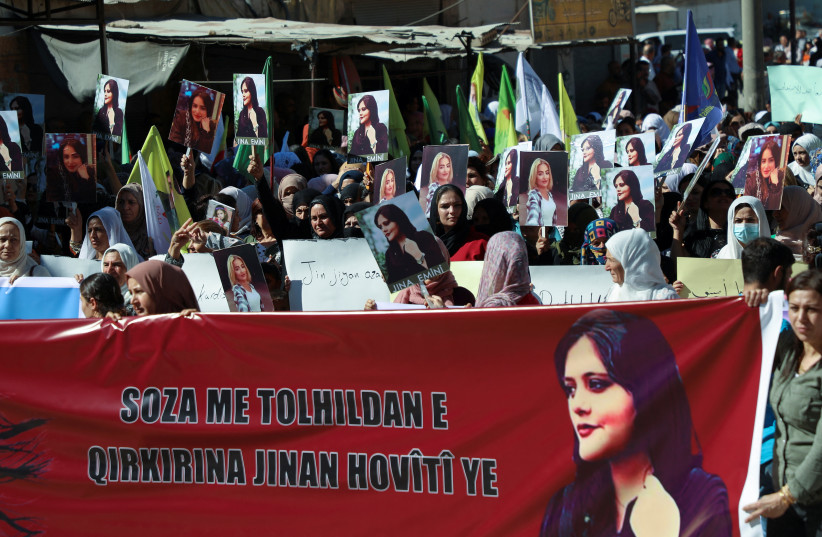In the wake of Mahsa Amini’s death, Iranian Supreme Leader Ayatollah Ali Khamenei will be disappointed that Iranian students are destroying textbooks that carry his image, throwing the pictures into the garbage and trampling them. His disappointment will be particularly acute, as Iran has recently been targeting girls in textbooks by increasing the amount of material celebrating female martyrs.
In fact, the Iranian curriculum has long acted as a vehicle to export its revolution, instilling in children the glorification of violence and jihad as early as first grade. But a new study into the Iranian curriculum by The Institute for Monitoring Peace and Cultural Tolerance in School Education (IMPACT-se), and authored by Dr. Eldad Pardo, shows an even greater degree of radicalization than in our 2016 report.
The United States is the primary antagonist in the ongoing conflict between Islam and imperialism, leading to the prevalence of chants of “Death to America,” and “The big satan.” Alongside calls for “Death to Israel,” known in Iran as the “little satan” and the celebration of Hamas rocket fire raining down on the Jewish state, Ayatollah Ruhollah Khomeini’s instruction that “Israel must be wiped out” now takes on a practical dimension, explaining that Israel’s destruction is achievable with reasonable effort and investment. In fact, the destruction of Israel is portrayed as a key condition for the world’s salvation.
What is in the Iranian education curriculum?
The pursuit of Iranian hegemony in the Arab Middle East is a vital goal: students learn that the world is divided between followers of Iran’s global revolution and those infidels who oppose it. They are taught that foreign militia members are now part of the Iranian regime. Our report pointed out that this likely means the regime may be inclined to use Arab militias to crush Iranian protesters, a fact which, sadly, was precisely what came to fruition. For the Iranian curriculum, enemies – Iranians and non-Iranians – are those who oppose the Khomeini revolution and friends – Iranians and foreign militiamen – are those who follow the path of the revolution.

While aspirations of Iranian hegemony in the Middle East are not a new development in the country’s school education, the theme has become more prevalent and specific. There is an effort to convince students that Iran’s wars in the Arab world are worthwhile and necessary for safeguarding Iranian prosperity and security, including the argument that Iranian governance of the region will allow control of much of the world’s energy supply alongside maritime trade passing through the Strait of Hormuz and the Suez Canal.
In the encouragement of political subversion of neighboring Arab states, there is a clear explanation as to whom this is directed against. Bahrain is described as illegitimate. Advocacy is dedicated to uprisings against puppet governments in the Middle East in the hopes of advancing what the textbooks laud as the school of Hajj Qassem Soleimani.
<br>Curriculum of martyrdom
THIS YEAR, the Iranian curriculum includes passages commemorating the martyrdom of the Islamic Revolutionary Guard Corps’ (IRGC) late terror master Soleimani, while Iraqi-Iranian terror leader Abu Mahdi Al-Muhandis is depicted as a model martyr of the Islamic World in a passage that is part of an entire chapter focused on exporting Iran’s revolution.
Iran’s militia doctrine and, implicitly, Iran-induced turmoil in places such as Iraq, Syria, Lebanon, Yemen and Gaza, are explained to students as contributing to the preservation of Iran’s internal security. The act of jihad is integral for defending Iran from invaders, fighting Iranian insurgents and supporting militias against the rival regional powers of Saudi Arabia and Israel.
Interestingly, the curriculum expresses admiration for the Muslim Brotherhood and its founder, Hassan Al-Banna, while conspiracy theories abound, including a tenth-grade textbook on “Defense Preparation” teaching the false claim that Saudi Arabia and the US created ISIS to sabotage Iran.
Familiar antisemitic tropes are a feature of the Iranian curriculum, including that Jews control the media, and that Jewish tribes have conspired and collaborated with enemies of Islam. Iran’s Arab neighbors are portrayed as servants of Jewish and colonial interests. Wars in the region are driven by Zionist aims to incite strife among Muslims, and Arab leaders are portrayed as ignorant and extremist Muslims sought out by America, Israel and the West to slander Islam. Jews and Sunni Muslims are, it is taught, working together to operate against all Shiites. Similarly, Jews are depicted as the enemies of the nascent Islamic nation and government.
The characteristics of Iran’s educational system must be factored into any assessment of the regime’s future plans and intentions. The curriculum provides us with a blueprint for the regime’s goals, values and worldview. In 2016, we argued that the curriculum was then limited in its power to widely influence students due to overly mystical dimensions, but that it would nevertheless be welcomed by hard-core loyalists. The curriculum has changed and now poses a very direct threat that must be taken seriously.
Curriculum, at the end of the day, does not need to convince everyone – just co-opt enough clerics, military commanders, soldiers, scientists, technicians and other elements of Iranian society vital to the revolution.
The writer is CEO of The Institute for Monitoring Peace and Cultural Tolerance in School Education (IMPACT-se).
